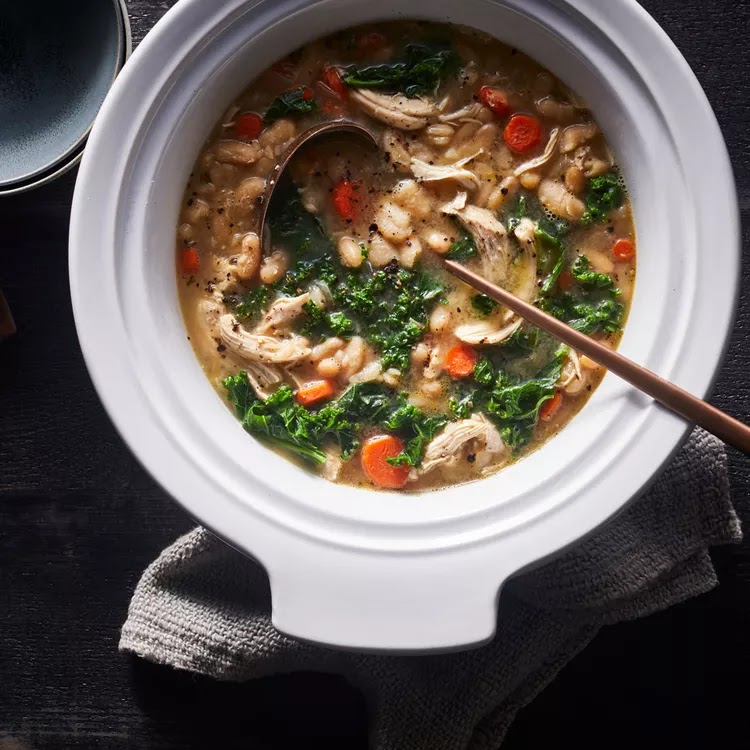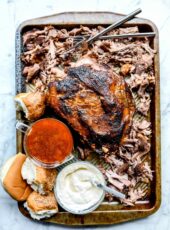This load-and-go slow-cooker chicken recipe is perfect for a busy weeknight dinner. Serve this Tuscan-inspired dish with crusty bread, a glass of Chianti, and a salad.
In This Post
Tips from the Test Kitchen
How to Safely Cook Cannellini Beans in a Slow Cooker
When preparing dried cannellini beans, the FDA recommends soaking them overnight, then boiling them for 30 minutes.
1. Soak the dried cannellini beans for a minimum of 5 hours or overnight.
2. Drain the soaked beans and put them in a large pot. Add enough fresh water to cover them by 2 inches. Bring to a boil. Boil the beans for 30 minutes.
3. Drain the beans and use them in your slow cooker recipe.
Can I Use Canned Beans Instead?
You sure can! Substitute 4 (15 ounce) cans of no-salt-added cannellini beans (rinsed) for the soaked dried beans.
Why Should I Add Parmesan Rind?
Parmesan rind is the outer layer that forms on the cheese as it ages. Instead of throwing the Parmesan rind away after grating the cheese, save it for soups and stews. It can be used to infuse your soups and stews with a rich and savory umami flavor. Although it’s completely edible, Parmesan rind is typically discarded after cooking. If you don’t have Parmesan rind on hand, feel free to omit it.
Can I Use Boneless, Skinless Chicken Breasts?
Yes, you can. Bone-in chicken breasts add more depth and flavor to the stew, but you can use boneless skinless chicken breasts if you prefer.
Additional reporting by Jan Valdez
Ingredients
1 pound dried cannellini beans, soaked overnight and drained (see Tip, above)
6 cups unsalted chicken broth
1 cup chopped yellow onion
1 cup sliced carrots
1 teaspoon finely chopped fresh rosemary
1 (4 ounce) Parmesan cheese rind plus 2/3 cup grated Parmesan, divided
2 bone-in chicken breasts (1 pound each)
4 cups chopped kale
1 tablespoon lemon juice
½ teaspoon kosher salt
½ teaspoon ground pepper
2 tablespoons extra-virgin olive oil
¼ cup flat-leaf parsley leaves
Local Offers
00000
Directions
Combine beans, broth, onion, carrots, rosemary and Parmesan rind in a 6-quart slow cooker. Top with chicken. Cover and cook on Low until the beans and vegetables are tender, 7 to 8 hours.
Transfer the chicken to a clean cutting board; let stand until cool enough to handle, about 10 minutes. Shred the chicken, discarding bones.
Return the chicken to the slow cooker and stir in kale. Cover and cook on High until the kale is tender, 20 to 30 minutes.
Stir in lemon juice, salt and pepper; discard the Parmesan rind. Serve the stew drizzled with oil and sprinkled with Parmesan and parsley.
Equipment
6-qt. slow cooker
Nutrition Facts (per serving)
| 493 | Calories |
| 11g | Fat |
| 54g | Carbs |
| 44g | Protein |
| Nutrition Facts | |
|---|---|
| Servings Per Recipe 6 | |
| Serving Size 1 1/4 cups | |
| Calories 493 | |
| % Daily Value * | |
| Total Carbohydrate 54g | 20% |
| Dietary Fiber 27g | 98% |
| Total Sugars 5g | |
| Protein 44g | 88% |
| Total Fat 11g | 14% |
| Saturated Fat 3g | 15% |
| Cholesterol 68mg | 23% |
| Vitamin A 4793IU | 96% |
| Vitamin C 20mg | 23% |
| Folate 32mcg | 8% |
| Sodium 518mg | 23% |
| Calcium 199mg | 15% |
| Iron 7mg | 39% |
| Magnesium 149mg | 35% |
| Potassium 1557mg | 33% |
Nutrition information is calculated by a registered dietitian using an ingredient database but should be considered an estimate.
* Daily Values (DVs) are the recommended amounts of nutrients to consume each day. Percent Daily Value (%DV) found on nutrition labels tells you how much a serving of a particular food or recipe contributes to each of those total recommended amounts. Per the Food and Drug Administration (FDA), the daily value is based on a standard 2,000 calorie diet. Depending on your calorie needs or if you have a health condition, you may need more or less of particular nutrients. (For example, it’s recommended that people following a heart-healthy diet eat less sodium on a daily basis compared to those following a standard diet.)
(-) Information is not currently available for this nutrient. If you are following a special diet for medical reasons, be sure to consult with your primary care provider or a registered dietitian to better understand your personal nutrition needs.
Powered by the ESHA Research Database © 2018, ESHA Research, Inc. All Rights Reserved

:max_bytes(150000):strip_icc():format(webp)/Slow-Cooker-Chicken-White-Bean-Stew-ed53cac31ea54722bee9dc6307e744e2.jpeg)





